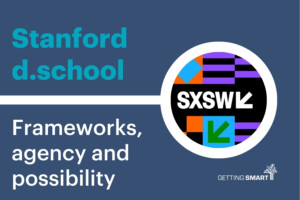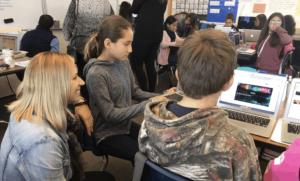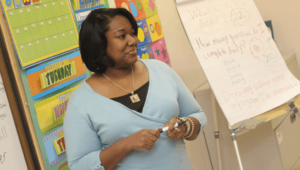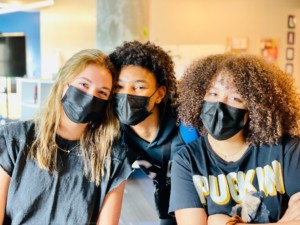Personalized PBL: Start With Senior Projects

This was the idea–quality education for all and each–that opened up the New Tech Annual Conference in Orlando. Jim May pointed out something that I think is important to hold: that while the conference was themed with personalized learning, NTN is not saying that it has all the answers, or a recipe for the practice. Because we value great education for all and each, we are going to focus on this idea of personalized project-based learning (PBL) so that we can learn together. We haven’t figured it out yet, but we will.
To be sure, PBL represents a great platform for personalization. Good PBL includes student voice and choice, so that students can be navigators and designers of their learning. Through the workshop model, facilitators can differentiate for varying student need. Still, questions remain: sometimes teachers wonder how to deal with the practice that has all of their students working on the same project at the same time.
To address that concern, and as a scaffold for our collective learning, the New Tech Model already has some components that are perfect examples of personalized, project based learning, and one of them is near and dear to my heart: Senior Project.
As a teacher at NTH in Napa, and later at nex+Gen, I got to see the transformative power of senior projects. In case you don’t do them at your school, here is how teachers at nex+Gen describe senior projects to community members:
One of the unique characteristics of nex+Gen is our requirement that seniors engage in a year-long project of their own choosing. The project can be about almost anything, but it has some specific requirements: it must have an academic component; a product of some sort must emerge from it; students must seek out and find an adult mentor for feedback and guidance; students must present their journey of learning at the end of the year.
Each project is individually done, and comes from the place of a student’s passion and/or interests. They negotiate with the facilitator on the topic of the project to help ensure its weightiness, and then they embark on a learning journey that is truly driven by what they need to know. Part of the process includes writing a research paper that informs their work. At the end of the process, the seniors present NOT to teachers, but to community members–and it is pass/fail.
Students rise to the occasion, and do extraordinary work when given the chance. Here are some examples:
- One student created, tested, recorded and illustrated tens of recipes to create her own vegan cookbook that is available on Amazon.
- Another student connected with the local university to work on micro-pumps that are nano-machines used for medicine.
- Several original albums have emerged from senior projects.
- Another student created and organized a fund-raising walk for Lupus Awareness.
As cool as those are, there are a lot of other really good reasons to do senior project and (by proxy) to do personalized PBL:
It is developmentally appropriate. As seniors get ready to move from the more structured high school experience into the wider world, Senior Project allows them to practice skills they will certainly need: asking adults for help; setting a budget and raising money if necessary; communicating with professionals in ways that keep the professionals from getting too frustrated. The list goes on.
It helps your teachers become better at facilitating. Because no teacher can be a content expert in all the topics of the senior project, it forces the teachers to help students learn how to learn, and how to focus on the learning outcomes.
It reinvigorates learning for burnt out seniors. One of my favorite quotations from a rather jaded senior about four weeks before the end of the school year: “I don’t really care about much other than my senior project.” Take a moment to savor the fact that you just read about a senior caring about his learning more than just getting out of high school. And this last year, at the end of the year, I asked my seniors “Should we make senior projects optional?” The resounding answer, in near unison: “NO!” As they justified that answer, they identified Senior Project as some of the most difficult but powerful learning of their high school experience.
It underlines the idea of growth mindset. Things will go wrong. Students will have to pivot and adapt. They learn that learning requires perseverance.
It has all the qualities of good PBL. Deep connections to the community, cross-discipline, driven by need-to-knows, voice and choice, authentic audience–the works.
Even with all the benefits, there are of course challenges. One of the biggest for the seniors is just coming up with a good project idea. Handily, in advocating for personalized PBL, the keynote speaker at NTAC, Tom Vander Ark provided a lovely scaffold!
He highlighted several of the big “megatrends” that students ought to be addressing. Here’s a photo of his slide:

These would be perfect for seniors to use as an impetus for senior project ideas. They are cross-disciplinary, rigorous and they have an effect on the world.
To be sure, there are lots of other challenges with senior projects, but several schools in the network of NT schools have figured them out. Reach out. Find a school who has worked out some of the kinks. Some good places to start: Amy Reece at nex+Gen Academy, or Riley Johnson at New Tech High in Napa or me. And look for another blog, some time in the near future about specifics on starting Senior Projects.
Finally, if you are anything like nex+Gen, taking on senior projects will lead to very interesting conversations like, “How do we make our classes more like Senior Project?”
And that, dear reader, is the beginning of a journey to personalized PBL.
For more, see:
- It’s a Project-Based World
- What’s Next? Personalized, Project-Based Learning
- Schools for Wisdom: Personalized Project-Based Learning
Stay in-the-know with all things EdTech and innovations in learning by signing up to receive the weekly Smart Update. This post includes mentions of a Getting Smart partner. For a full list of partners, affiliate organizations and all other disclosures please see our Partner page.





0 Comments
Leave a Comment
Your email address will not be published. All fields are required.